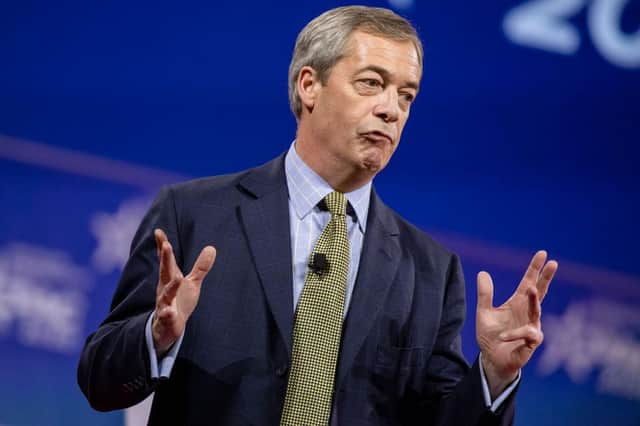Reform UK: Nigel Farage and Richard Tice have rebranded the Brexit Party an ‘anti-lockdown platform’ - what you should know


Nigel Farage has announced that he will rebrand the Brexit Party as an anti-lockdown platform known as Reform UK.
The UKIP leader, who has never been elected as an MP, said his party would give “a political voice” to those in opposition to strict measures introduced to reduce the spread of the coronavirus.
Advertisement
Hide AdAdvertisement
Hide AdAnnouncing the launch on Twitter, he said: “There is now a political choice on lockdown and we wait to see whether we get a genuine Brexit. Beyond that, our whole system of government is not working and needs wholesale reform.”
The Brexit Party contested 275 seats at the 2019 election but earned just 2% of the national vote, failing to get a single MP into the House of Commons.
What will Reform UK stand for?
Nigel Farage and party chairman Richard Tice revealed the rebrand via a co-authored article on The Telegraph, saying that it was “time to redirect our energies”.
Revealing the party’s anti-lockdown stance, Tice wrote “the need for major reform in the UK is clearer now than ever. A new approach is essential, so that government works for the people, not for itself.”
Referring to the virus he said it was time “we learn to live with it, not hide in fear of it”.
In a scathing attack on the government’s handling of the pandemic, they said: “the 'strategy' has been to terrify the nation into submission, coupled with a barrage of lockdowns, rules, regulations and threats. It is all about playing for time, in the hope that a vaccine miraculously comes along.
"This is no way to tackle a disease which may be around for a long time, perhaps forever. The consequences to wider health and the economy have been devastating.
"Suicides are soaring, from students imprisoned in halls of residence to 88-year-old ladies who cannot see their relatives and naturally wonder: what is the point of life?"
Advertisement
Hide AdAdvertisement
Hide AdThe party have said that they are instead in favour of following herd immunity. Farage had previously criticised a policy of herd immunity, tweeting in March: “So government policy is that it is desirable for COVID-19 to kill hundreds of thousands of people so that we develop herd immunity. Just can't believe it.”
Beyond the pandemic, the duo said that they would call for the reform of the House of Lords, the BBC, the voting process, law and order, and immigration policy, describing them as "badly run, wasteful quangos".
They added that the Home Office was currently “not fit for purpose”.
Would herd immunity work?
The party have said they’re in favour of a herd immunity approach, citing the Great Barrington declaration, a letter signed by 15,000 scientists and medical practitioners backing the proposal – though many names on the letter were found to be fake.
The declaration called for the vulnerable to shield while the low-risk sectors of the population carry on as normal.
Herd immunity is achieved when the vast majority of a population becomes infected with a virus to prevent it spreading.
If such a high proportion of a population have already had the virus, or have become immune after a vaccination, it reduces further spread, helping to protect those who have not yet been infected.
Depending on how contagious a virus is, around 70 to 90 per cent of a population needs to be immune to protect the uninfected and achieve herd immunity. However, recent studies have suggested this figure may actually be much lower.
Advertisement
Hide AdAdvertisement
Hide AdThe threshold differs between illnesses and its level of contagion, with the likes of measles, for example, requiring around 95 per cent of people to be vaccinated to stop it from spreading.
Such an approach would come at the cost of thousands of lives, with thousands more impacted by the long term health impacts of contracting the respiratory disease.
Critics of the approach argue that it is not possible to completely shield high-risk groups and question whether it is ethical to completely cut-off certain demographics.
With little known about how immunity is developed, it would also represent a high-risk strategy.